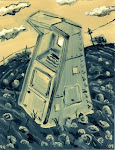You know…I kind of wanted the big banks to fail. I did. I admit it. I am not saying this is a responsible “want” but it is true. In fact I REALLY wanted the banks, the banks that were too big to fail…to fail. I still do! Now that they haven’t it certainly is no better for the majority of us and they are not exactly loosening their assets, their belts (despite their obesity) nor are they reaching out a hand to help the little guys, the small businesses, the families on the brink of foreclosure. They have no interests at heart but their own. They also have NO IDEA how they are generally perceived by the public-at-large. They are so indifferent I am not sure if we should call it obtuseness or absolute, cold-hearted indifference. So yes! Let the big banks fail. Naturally the little banks like the one you manage (it IS little isn’t it?) are an exception. They are exempt from this particular batch of vitreole. In fact I just read that seven more little banks just failed. I'm so sorry. If there is anything I can do let me know. Maybe now you will write to me. I wonder how they feel about Goldman Sachs just now.
I probably shouldn’t blame the banks. They are only bricks and mortar after all. It is those individuals who specialize in holding up the banks on a daily basis by working their financial wizardry…they’re the ones we should hold culpable. Remember when I say banks I mean hedge funds, private equity firms, the whole shebang.
Once again I’ve spoken my piece and I still feel there is a whole lot more to say and until I have said it all I can never, ever feel satisfied. I can never relax. My temperature is rising. I wouldn't be in the least bit surprised to hear news of more and more people spontaneously combusting rare phenomena though it is.
Your most disgruntled client,
K. Witherkay
Ps-You are not real and I am not getting real. Let us both get real. I will help you by imagining you into existence, imagining how you could be. You can help me by preventing me from hurting myself. Take away the sharp knives, the financial instruments, the credit I, like so many, find so easy to abuse.





















